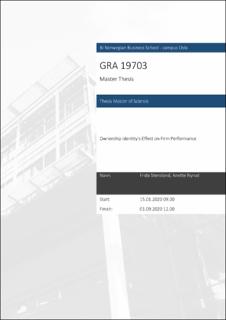| dc.description.abstract | This thesis is a research on differences in performance between state owned and
privately owned companies in Norway, including all registered companies in the
time period between 2000 and 2017. Norway is a country where the state plays an
important role in regular markets due to their significant share of ownership in the
country. Hence, the management of state ownership in Norway is important for
the trust in the Norwegian capital market. Previous research suggest that state
ownership have a negative impact on firm performance as governments are also
expected to use their influence to reach sociopolitical goals that are not profit
maximizing. This thesis hypothesize that state owned firms have lower
performance than private firms, as private investors commonly focus more on
efficiency, profit maximizing and personal gain.
Through a cross-sectional analysis, the hypotheses are investigated
simultaneously. Firm performance is defined as return on assets, and the impact
by state owned and privately owned firms are tested by defining variables for
ownership identity in five different intervals, as well as corporate governance and
firm effects.
The results show that state owned firms have lower performance than privately
owned firms, which was further confirmed when testing for the effects on
performance of firms having the state as a large blockholder compared to nonstate
blockholders. Higher number of blockholders affect firm performance
positively, while a higher number of board members have a negative impact on
performance in a firm. In addition, we find that the control variables of our
analysis have a high degree of explanatory power, giving them a relative
importance when studying firm performance in terms of ownership identity.
Moreover, state owned companies are found to be associated with a more negative
firm performance, both when holding a small stake of a company as well as when
being a large blockholder. | en_US |
